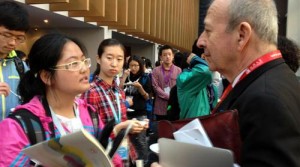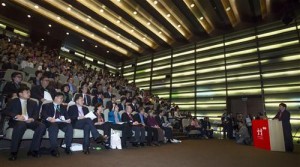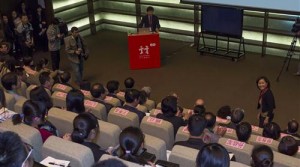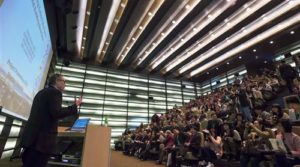(Shantou, 18 February 2013) Is it a hype? Is it a goldmine? Scarcely a day goes by without a headline about Big Data – big data indeed have become very big. This week Shantou University hosts six renowned experts in computational biology and medicine from leading US and UK universities and research organisations to lead a conversation with 82 high school students from 25 Chinese provinces and cities about this very big topic “Big Data and Future Medicine”, which is the central theme of this years’ Project Prometheus Bootcamp.
Introducing 2013 Bootcamp’s mentor list, Professor Lin Haifan, Professor of Yale University and Council Member of Shantou University, said the mentors this year are all top scientists in their specific fields of studies. They share a dedication to research and science and a keen interest to excite these young curious minds to the coolness in a life of research and the excitement of exploring new frontiers in sciences.
Joining Professor Lin, the mastermind of Project Prometheus, will be Dr Enrol Gelenbe, Dennis Gabor Professor in Electrical and Electronic Engineering Department of Imperial College London; Dr Jill Mesirov, Associate Director of Board Institute of MIT and Harvard; Dr Isidore Rigoutsos, Director of Computational Medicine Center in Thomas Jefferson University; Dr Edward Rubin, Director of US Department of Energy Joint Genome Institute; and Dr Cathy Wu, Edward G Jefferson Chair of Bioinformatics and Computational Biology in University of Delaware.
Project Prometheus is sponsored by the Li Ka Shing Foundation (LKSF), supported by the Ministry of Education and the People’s Government of Guangdong Province, co-organised by the Chinese Society of Education and managed by Shantou University.
Dr Shen Jiliang, General Deputy Director, Department of Basic Education II, Ministry of Education, said Project Prometheus is of great significance in promoting international cooperation, seeking collaborative education, inspiring the young students’ scientific and innovation spirit, as well as nurturing creative talents.
“I hope you can discover and develop your own interest, and see clearly your destination through learning and practice. Once you find your interest and direction, you should persevere with them. Turning your interest into intention, and then into the ambition you strive for, you will harvest a more wonderful and enjoyable life,” he told the students.
Dr Anthony Fung Shiu-lun, Executive Director (Operations) of the Li Ka Shing Shantou University Foundation, thanked Professor Lin for his effort in organising Project Prometheus. Dr Fung said, “One of LKSF’s most important projects is driving educational reforms through Shantou University. It is our Chairman Mr Li’s conviction that only through such reforms can our country’s future be a bedrock for true abundance in growth, sustainability and freedom for all.
“The recent rapid development of education technology, cloud-based solutions, mobile devices and applications combined forces to bring disruptive changes to the current ‘modus operandi’ in education. This tsunami of technological possibilities will re-define how institutions can deliver effective learning for students and individuals who want to learn. Residential university and its value propositions offered will have to be reexamined and reengineered to better education.”
Dr Fung said the advances in technology in combination with genomics research had enabled the aggregation of massive data and analytics at a level beyond a life scientist, a physician, and a hospital could easily comprehend.
“Along with Shantou University, LKSF has embarked on initiatives that combine the power of technologies and research networks – putting big data at work for the rapid insertion and adoption of new capabilities leading to disruptive change in medical curriculum, healthcare eco-system and education reforms.”
For more information about Project Prometheus, please visit:
http://prometheus.stu.edu.cn




